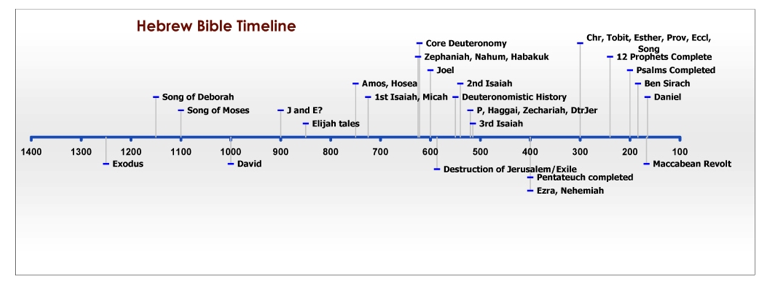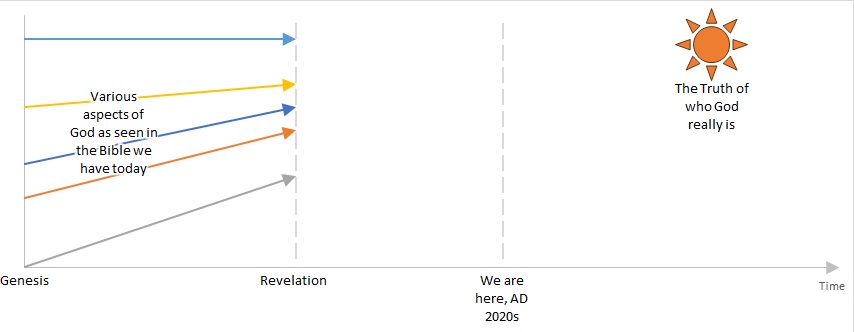
For some time now, I’ve been learning about the formative process of the Bible itself – how many of the “books” were often spoken stories that were eventually recorded in written form long after the events, how others were written under assumed names, how the various books were collated by religious communities, how those communities decided which ones merited canonization, and eventually how they all coalesced into the volume of books we commonly call the Bible.
It’s clear to me, purely from the sheer volume of solid information, that this was a very human process. That’s not to say that God wasn’t involved, as much as to recognize that it was a process chock full of human intentionality. Some of those intentions were pure, but I believe some of them were not. For example, the Roman emperor Constantine forcibly directed the Christian priests of his day to get over their disagreements and settle on some common doctrine, purely to end the strife and create a unified religion that might unite the empire. One may choose to believe, or not believe, that this action on Constantine’s part was directed and led by the Holy Spirit to achieve God’s precise plan for His word. But it was undeniably full of human decisions.
If one insists that it was supernaturally and perfectly directed by God, then one must somehow address the fact that various Christian denominations recognize different sets of books as “the Bible.” I grew up convinced the right answer was 66, along with probably the majority of current American evangelicals. But my Roman Catholic friends would insist that the right number was 73 – and most evangelicals are entirely unaware that most American Protestant Bibles also included those extra seven books as “the Apocrypha” until the mid 1800s, being removed mainly to reduce printing costs. And Orthodox believers would require 81 or even sometimes 86 books. Is God schizophrenic, or perhaps is God okay with this variation?
Once I began to understand that my own particular dogmatic assertion about the nature of the Bible might, in fact, be just that – dogma, not necessarily Truth with a capital T – I had to rethink a lot of my assumptions about the Bible.
I’m still in learning mode, or more precisely, in repentance mode. I’m having to repent (in the sense of changing how I think) of a lot of my insistent dogmatism about the Bible. And it’s a long and slow process, because each step of learning and repenting can be laborious. I’m unwilling to be flippant about something so central to my faith and my sense of a relationship with God. And there’s a repetitive nature to this process: so many things are so tightly interdependent with how one views the Bible, that the same topics keep arising again and again, and often, they reinforce one another. So I don’t expect this process to end anytime soon.
And I am finding that quite a few things appear to simply not have a firm answer. For example, as I noted above, one may choose to believe or not believe God’s supernatural omnipotence in assembling the Bible, and it probably all hinges on what one believes about God more than what one believes about the Bible – but we think that we get our ideas about God FROM the Bible, and so it’s this nasty circular logic loop that doesn’t have a clear exit point or sense of a deciding factor.
And that, by itself, is quite frustrating, almost depressing sometimes. These dogmas have been so central to my identity for over 40 years that it is somewhat traumatizing to release so many things to uncertainty and unknowability, and frankly, I don’t see any end in sight in my near future.
In the last episode, “There is Joy in Disconnection,” I wrote about the peace and joy in the midst of my feelings of betrayal by my former religious community. And I’d like to identify another of the positives amidst the frustrating and nearly depressing process of deprogramming or deconstructing my understandings about the Bible, and thus about God.
One of the side effects of learning about the humanness of the Bible’s creation – its incarnate nature, if you will – is recognizing that the Bible appears to have evolved significantly over the time of its creation. (I carefully use the word “creation” rather than “writing,” because Hebrew writing wasn’t developed until centuries after the time when Moses traditionally would have written the first five books. So at BEST, Moses didn’t write in in Hebrew; at worst, Moses was only the subject of oral tradition until many hundreds of years later.)

One of the first things to fall apart in my old ideas about the Bible was the concept of “univocality” – that the Bible speaks with exactly and only one voice about every topic, that it’s a unified and purposeful treatment of every single topic. I now realize, and am somewhat ashamed by this realization, how much mental gymnastics I used to do to overlook or explain away many rather obvious differences in stories and doctrines within the Bible itself. I was unwilling, or perhaps scared, to admit that the Bible isn’t entirely self-consistent. As a most obvious example, there are different rules and regulations in Leviticus and Deuteronomy for the exact same topics, and then Jesus entirely and rather pointedly sets aside various of those rules. This topic of univocality alone could occupy pages of writing and hours of podcasts, but many people much smarter and better studied than I have already done so.
Some of the biggest areas of concern for me are the very nature of God, and His desires for us and requirements upon us. Those things seem to drift wildly across the breadth of the Bible. It makes my spiritual ground extremely unstable.
The eventual consequence of that realization of non-univocality is the need to decide what I believe and trust about the Bible. And that became rather discouraging. I wanted a simple faith in a simply perfect book about God, and a clear and unambiguous set of facts about how I was supposed to behave and believe. But it wasn’t there any longer.
And quite frankly, this threw me for a loop, and I’ve been emotionally spiraling around this topic for a few months.
And then something just occurred to me.
In the midst of uncertainty over what unshakable things I might hold on to, I realized that staring me in the face of all this shaking, shifting, changing stuff in the Bible was something that very much did NOT change or shift or shake.
In a word: Trajectory.
Let me explain.
Way back at the beginning of the Bible, God is presented as a council of beings, sounding much less like our sense of Father/Son/Holy Spirit, and more like a panel led by a chief justice or supreme deity of some kind. “Gods” are mentioned again and again early in the text. But over time, such ideas seem to coalesce into one God, self-sufficient, alone above any other minor deities that might exist.
At the beginning of the Bible, God is presented as a fairly harsh deity, with little real patience – in fact, God gets so impatient with humanity that all but a handful drown in God’s flood. But over time, God’s patience and mercy increasingly appear and become overriding.
At the beginning of the Bible, God is strongly warlike and routinely commands the slaughter of entire peoples who just happen to be in the way of the Israelites. Later on, God emphasizes explicitly building a unified people of every tribe, tongue, and people-group, willing that none should perish. Even Revelation, with the slaughter of the unfaithful, John speaks of the gates of God’s new heavenly city as never being closed, offering a way for them to come home in the afterlife.
At the beginning of the Bible, God commands death for many sins. Later on, God commands death itself to be cast into the lake of fire, to trouble no human again.
At the beginning of the Bible, the laws include purity codes so harsh that minor infractions result in death – even of a man who tries to protect God’s own Ark of the Covenant from falling off a cart. Later on, Jesus intentionally breaks many of those laws to heal and minister to the poor and infirm, and yet is portrayed as being without sin.
At the beginning of the Bible, God is wholly vested in one small tribe, and appears determined to isolate and set them apart from every other tribe and nation as God’s own special people. But over time, God becomes more inclusive and welcoming of the foreigner and alien, until the writer of Hebrews even argues that because the Jews resisted God’s call, it was God’s intention to fulfill ancient prophecies with people from every nation on earth.
This is not a static view of God. It’s a view full of trends, of changes – of trajectories.
And note that “unchanging” is itself a trajectory: simply a flat or constant one. In some ways, God’s nature is presented as very consistent. Themes of concern for the oppressed and poor and needy never waver across all of scripture. God’s desire for relationship with humanity never changes. God’s care for the singular, for the individual, appears over and over. God often uses the second-born to do essential things. God routinely highlights women’s importance and agency in culture after culture rife with patriarchy that consider women as mere property of men.
Put this all together, and here’s what I see:
Over the millennia of the stories told in the Bible, we truly don’t see one unchanging view of God. I believe what we see is people increasingly becoming more and more aware of what God really is. And the view that they have solely within the written Bible itself is incomplete – but it’s got a very clear trajectory.
And the beautiful thing about a trajectory is that you can extrapolate it. You can make a simple assumption that whatever trend you identify will be continued.
- God is seen as increasingly one unified, self-existent deity.
- God is seen as increasingly loving and patient and merciful.
- God is seen increasingly interested in peace and unity.
- God is seen as increasingly restoring and redeeming.
- God is seen as increasingly multicultural.
One could assume that these trends will continue! And through it all, God’s focus on charity and human justice for “the least of these” never wavers.
So when I reach the end of the Bible and am not really sure what is perfectly trustworthy, I suddenly sense that I can nonetheless trust those trajectories with utter confidence, and more than that, I can trust that those trajectories did NOT end with the last stroke of the pen in whatever collection of writings a given denomination calls the Holy Scriptures.
And in light of that, how can I know God?
I can determine to follow those trajectories wherever they lead.
As an engineer, I know this: when there are multiple trends of data that are pointing towards something true, they’ll all cross at some point, and that’s where I’ll find the answer I need. And so in the Bible, I can look at those trajectory lines at ANY point, and predict with fairly high confidence that I know something about God. In some sense, those trajectories, those trends, are what I think the Bible is all about, and if God had any real supernatural role in overseeing its storytelling and writing and assembling, I have faith that He ensured that those trajectories remained visible. The details of any given story are far less important: each one is simply a data point about God. But when I see a number of data points, they inevitably form a consistent line, and from its direction I can infer with some confidence where they’re all pointed. At the intersection, I’ll discover the truth about God.
I’ve illustrated this trajectory idea in this simple image.

When I finally see the changes across the Bible, instead of seeing a static, unchanging view of God, it gives me an amazing hope and sense of ongoing, increasing revelation of God that is still only partial – but points clearly to some future completion of this God image. We’re in that uncomfortable liminal space between the Bible and the Truth, and it’s often so hard to see beyond Revelation – or beyond now. And what’s holding us back from seeing it clearly? I think it’s us – humanity – our brokenness and blindness – but a humanity which God foretold would eventually be perfected into God’s image over time. Honestly, looking around, it’s pretty clear we still have a ways to go – but every day I see more and more people looking along this trajectory, and asking “what are we still missing? What was God pointing us towards in the Bible? What is God saying now? We can do better.”
So perhaps I can stop worrying about whether the Bible is complete, or perfect, and I can stop worrying about the particulars of a translation, and stop fretting about whether a given book was truly written by a supposed author, and instead take a very large step back and look at those trajectories and see where they all point.
This would all make sense, by the way, in light of Jesus’ promises that in his absence the Holy Spirit would teach us all things, and that we would do greater things than Jesus did. One can hardly read the Gospels without getting a sense that the story isn’t finished – and this gives me hope that we actually do know something about where it leads.
One final thought: this season is hard for me because there’s no clear end point, no metric that says “you’ve arrived” or “this is enough.” But nonetheless, I can see a trajectory in my own life and my own faith. Right at this moment, I don’t necessarily need to know anything more than this: the trajectory is upwards, drawing closer to God over time. And that’s enough for me. I’ll keep saying “Yes” when God challenges me to surrender some long-held ideas about the Bible or my faith, because in my experience, every time I do, I sense another nudge upwards, closer, higher.
Thanks for your time – I hope this encourages you to be patient with your own process and progress, and look for where things are pointing, not where they are now. Keep your eyes on the goal, and where you stand right now won’t seem nearly as important as moving forward with God, toward God.
Be blessed, my friends.
